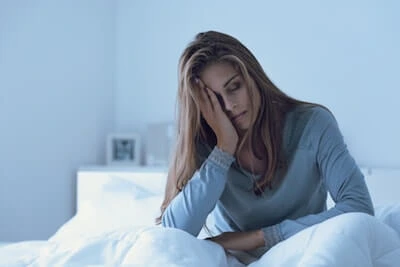Sleep Apnea
Sleep Apnea Treatment
 Sleep apnea is a potentially life-threatening health condition involving repeated pauses in breathing while sleeping. The more common form of the condition is obstructive sleep apnea (OSA) which is when an airway obstruction interferes with oxygen flow through the nose or mouth while the individual sleeps. In patients afflicted with OSA, the muscles of the throat and mouth relax when they are asleep to the point where they fall back into the airway and create a blockage that restricts the patient’s breathing.
Sleep apnea is a potentially life-threatening health condition involving repeated pauses in breathing while sleeping. The more common form of the condition is obstructive sleep apnea (OSA) which is when an airway obstruction interferes with oxygen flow through the nose or mouth while the individual sleeps. In patients afflicted with OSA, the muscles of the throat and mouth relax when they are asleep to the point where they fall back into the airway and create a blockage that restricts the patient’s breathing.
Signs & Symptoms of Sleep Apnea
The signs and symptoms of this condition during sleeping hours may include:
- Loud snoring or breathing.
- Episodes of stopped breathing.
- Sudden awakenings.
- Episodes of gasping for air.
- Complications getting a good night’s sleep.
An individual may exhibit signs and symptoms of sleep apnea throughout the day as well. For instance, when left untreated, it may lead to a morning headache, excessive daytime sleepiness, difficulty concentrating, and irritability.
Our South Huntington dentist, Dr. Joseph Ayoub will commonly conduct a sleep study to determine the severity of the disorder. This study’s results and other medical findings will play a role in determining the recommended treatment. A common form of therapy is a CPAP machine worn when sleeping. A CPAP machine gives the patient a constant flow of pressurized air into the respiratory system through an attacked mask.
An oral appliance may be an appropriate treatment in mild to moderate sleep apnea situations. Like a traditional mouthguard or an orthodontic retainer, the oral device is designed to help keep the patient’s tongue and the soft tissue at the back of the throat from collapsing, obstructing, and enabling the airway to stay open during sleep. In addition, an oral appliance is easy to wear, care for, comfortable, and portable. Oral devices are individually fabricated and customized for both maximum effectiveness and comfort.
Treatment Options For Sleep Apnea
Suppose you only suffer from a mild case of sleep apnea. In that case, our dentist, Dr. Joseph Ayoub may recommend lifestyle adjustments to keep your airway unobstructed while you sleep. These often include:
- Cutting back on alcohol consumption
- Losing weight
- Quitting smoking
- Modifying your sleeping position so that you are on your side instead of your back
- Using pillows to elevate your head and promote breathing while you sleep
- Eliminating heavy meals right before bedtime
In the more severe sleep apnea cases, lifestyle adjustments may not be effective by themselves. In these cases, Dr. Ayoub may recommend other sleep apnea treatment options available to patients in the Huntington NY area.
Oral Appliance Treatment
With oral appliance therapy, the patient wears a customized mouthpiece to maintain an unobstructed airway when sleeping. These FDA-approved devices perform several vital functions to prevent any soft tissue from collapsing and blocking the airway:
- Stabilize the tongue and jaw to eliminate any airway obstructions
- Reposition your tongue, soft palate, and lower jaw
- Support the muscles to help prevent a collapse of the airway
Dr. Ayoub typically prefers oral appliance therapy as his sleep apnea treatment method due to the practical results that we can achieve.
CPAP
Continuous positive airway pressure (CPAP) has been the gold standard for sleep apnea therapy for decades. It is a medical device that uses a mask worn over the individual’s nose and mouth and delivers a constant flow of air pressure when sleeping. This continuous air pressure aids in keeping your airway open all night.
While CPAP is a safe and effective sleep apnea treatment method, many patients find it somewhat uncomfortable, so they don’t use it as often as they should. For this reason, our sleep apnea specialist, Dr. Joe Ayoub, will often recommend oral appliance therapy before trying CPAP.
Surgical Treatments For Sleep Apnea
Surgery may be necessary when patients don’t respond to an oral appliance, CPAP, or other non-surgical treatments. If you need surgery, your surgeon will tailor it to the area of obstruction in each particular case. These obstruction areas can be anywhere in the upper respiratory tract and include the nose, tongue, and throat.
Schedule A Consultation At Dentistry By Design, PC
Call our South Huntington dentist at 631-823-1004 to schedule a consultation with Dr. Joseph Ayoub. With over 20 years of advanced training, our dentist cares for patients with sleep apnea from South Huntington, Huntington, Melville, NY and many areas throughout Long Island.
